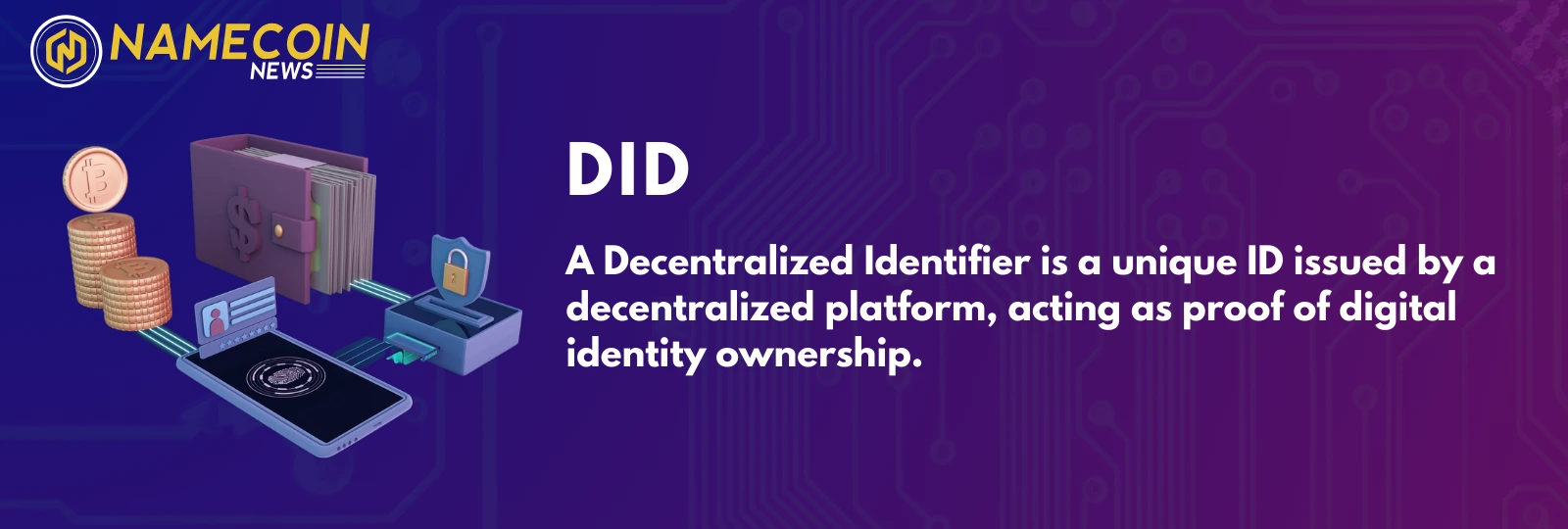What DID means, it represents a breakthrough in secure and private identity verification, because it moves us toward user-controlled identities, blockchain-based. DID are part of emerging digital identity frameworks intended to protect users’ privacy while making secure interactions online possible.
What Is DID?
DID, or Decentralized Identifier is a new way to prove our identity without depending on centralized authority. With DID, an individual controls his or her own digital identity without reliance on traditional institutions such as banks, governments, and companies, but blockchain technology serves as the security and privacy medium.
DID empower users to own, share, and control their personal data, to connect online in a safe, privacy-focused environment. Industries such as finance, healthcare and digital services for whom consumer data security & privacy are of utmost importance.
How Do DID Work?
DID technology relies on blockchains, the fundament of DID tech. Here’s how DID work:
- Generation of DID: A user or organization would generate this DID using a cryptographic key in some kind of decentralized system.
- Identity Authenticity: The DID has metadata. With no central figure, it can be independently verified. The proof of the identity is, in fact, the private key of part user.
- Data Sharing and Privacy: Users Own the Data, They determine what to share & with whom. It is done through the blockchain-stored thus making sure that data are secured and tamper-proof.
- Interoperability: DID (Decentralized Identifiers) are platform-independent and users can fully own these identifiers giving them freedom to use the identifier across services.
They function on numerous platforms while remaining versatile with all intending blockchain systems.
Here is where decentralized identity separate itself from a digital identities that are often stored in some central authorities like government databases or the well known social media accounts.
Why Are DID Important?
DID give control and ownership of their digital identities to the users, an extremely crucial point of privacy in an increasingly digital world. Here is why they matter:
- Data Ownership: DID give power of data control back into the hands of the users, thus reducing dependency on third parties.
- Protects Privacy: The possibility of secure and private data sharing becomes easier with DID and thus with a reduced chance of data leakage.
- Improved Security: DID tap into the blockchain cryptographic security to eliminate identity theft and hacking.
- Global Interoperability: DID are portable and interoperable with other networks, thus very useful in international digital communications.
As awareness about the digital privacy threat increases and as people gain interest in taking control over their information, the significance of DID will increase.
Pros & Cons of DID
Pros
- User Empowerment: The users are in full ownership and control of their identity data. They determine what they would like to share.
- More Security: Blockchain technology gives better security from data theft or identity theft.
- Interoperability: DID work in between various systems and applications.
- Privacy Protection: Has reduced unwanted sharing of information with central bodies.
Cons
- Tech Dependence: DID rely on blockchain, and it makes the user understand and trust the blockchain technology.
- Lesser Knowledge: Most people are still unknown to DID technology and how it really works.
- Ease of Initial Configuration: A DID can be difficult to configure for non-tech users.
The pros and cons of DID help a user balance the potential benefits against the learning curve and the technicalities of running a decentralized identity.
History of DID
DID research started as blockchain technology developed, especially as a response to the lack and insecurities of centralized identity management systems. Major developments in DID history include:
- Early Blockchain Development: Blockchain formed the foundation of decentralized systems, one of which was identity verification.
- W3C Involvement: W3C set up standards for DID across the platforms.
- Enterprise Adoption: The tech giants and the startups started considering DID for safe user-centric identity solutions.
Understanding the history of DID gives a picture of how decentralized identity systems came to be developed and adopted for meeting the modern needs of security.
Important Facts and Components of DID
DID consist of unique identifiers as well as metadata ensured to secure the user’s control. The most important elements as well as the milestones in DID development include the following:
- Cryptographic Security: DID use public and private keys for authentication in a safe manner.
- W3C Standards: W3C standardization efforts have made DID interoperable across the platforms.
- Blockchain Integration: Most DID rely on a blockchain structure offering a decentralized and tamper-proof identity solution.
- Self-Sovereign Identity: This is the concept that forms the basis of DID, in which complete control over digital identity by users is maintained and reliance on any third-party entity is eliminated.
Some significant milestones for DID are W3C interest and the growth of self-sovereign identity, which indicate the prospect of its mass-scale adoption.
Benefits of DID
DID provide several benefits to digital identity management, especially related to privacy and security:
- Data Security: The blockchain ensures that no data can be altered or modified.
- User Control: The user is in control of their identity and data, which leads to the minimization of personal information being shared.
- Interoperability: DID work on multiple platforms and are hence versatile for several online interactions.
- Fraud Reduced: Cryptographic verification by DID minimizes the risk of identity theft and fraud.
These benefits of DID technology make it especially desirable for individuals and businesses in search of secure, private digital identity solutions.
Conclusion: The Future of DID
The Federal Government and the private sector in the USA have been finding DID increasingly crucial for answering the concerns raised against privacy and security. As blockchain gains fast ground, DID can potentially revolutionize digital identity management by giving users control and privacy. As blockchain continues to advance, safe, decentralized identity systems like DID may soon become a norm as people lock up personal data online.

